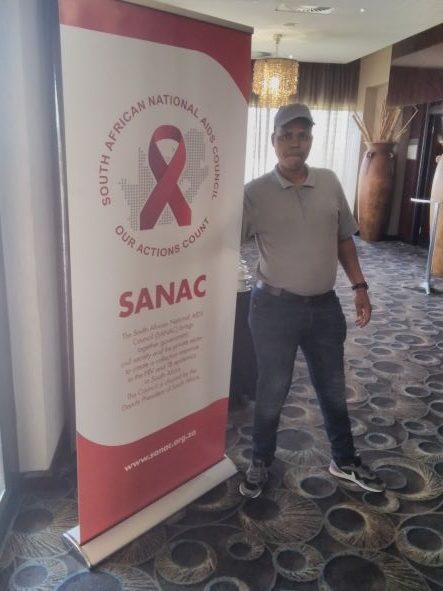WHEN MEETING Koketso Mokubane, the first thing you notice is his smile.
Koketso is a Community Linkage Officer in Gauteng, for the South African Network of People Who Use Drugs, (SANPUD) a registered non-profit organisation made up of organisations run by, and for, people who use drugs, fighting to defend their rights.
His journey from a service beneficiary of the needle exchange programme in the streets of Pretoria to advocating for changes in policy and service delivery was motivated by what he calls “the gaps, for us as people who use drugs, the stigma, associated with us, even though we are still working”.
He experienced first hand how the professionals, social workers, and clinical associates “come from a different source” and did not always respect the contribution from the “point of lived experiences” of the members who were working as peers.
In a 2020 research paper published by International Development Policy authors Dr Scheibe, Shaun Shelly, and Dr Anna Versfeld, found that “healthcare providers in South Africa tend to come from the communities they serve and are often representative of dominant moral positions around drug use. They are neither sensitised nor equipped to manage the realities and needs of people who use drugs”.
This has meant that stigma and discrimination towards people who use drugs is widely accepted in healthcare facilities. This includes denial of care, conditional access to care, shaming, lack of confidentiality and privacy and being made to wait disproportionately long periods for services.
Organisations like SANPUD are giving voices to people who use drugs to dismantle myths, hypocrisy and bad science that inform society’s understanding of drugs, their use, and the people who use them.
The organisation’s mantra of “nothing about us without us” comes to life in the work that Koketso does. He brings the voices of people who use drugs into the rooms and tables where policy about and services to people who use drugs are being discussed.
He is a member of the Community Committee of the International Conference on Health and Hepatitis Care in Substance Users (INHSU).
As a member of the Community Committee my role includes “facilitating scientific knowledge exchange through a series of virtual and in-person events, including our annual conference where we are planning on having a community day at INSHU conference in Glasgow Scotland; develop and deliver international education programs for health care providers working with drugs and alcohol settings; influence policy through our advocacy work which raises the voices of the communities we work with; giving advice/input to INSHU in delivering other programs for an example, the storytelling for impact; and I am part of the planning committee for community day at the INSHU conference in Glasgow,” says Koketso.
Koketso’s quiet determination in getting his voice heard contrasts with that of the activists who have relied on making noise to grab attention in rooms where they can be easily ignored. He relies on getting his point across and changing people’s minds through his own behaviour, a lesson learnt from his peer educator work, where people judged him on his dealings with them.
He recalls how the first impression that others had of him, was always changed by how he dealt with them rather than getting into “back and forth conversations about things. I have recently encountered people who say, you know what when I first met you, I thought you were this kind of person, but you are not”.
Koketso works from the Sediba Hope Medical Centre in the central business district of Pretoria.
His works includes walking the streets to find people who are using drugs, who may be engaging in risky behaviour, like the sharing of needles. His focus is talking to them about the harm reduction services that are available from the Sediba Hope Medical Centre.
He knows the dangers involved and his own story of contracting hepatitis and getting help from the Community Oriented Substance Use Programme is the beacon that some of them may be looking for while in the grip of the problematic substance use.
“The people know me. They know, my story. I know myself. Actions speak louder than words. I try not to get into altercations with the guys on issues about use. They know that I have walked the path, which makes me able to relate to them”.
His actions include being at the scene and saving an opioid user who was overdosing, and he and a colleague administered naloxone, quick think and preparedness that saved a life.
Some of the people who use drugs have come to internalise the stigma and negative things that they hear about themselves from others.
“Because society has planted this seed in our minds, that we are dirty, unclean, already that seed stays in the mind, and the person ends up acting like that, just because of his family, the rejection that they are experiencing”.
For Koketso, reclaiming their own space in the world, building their self- esteem, and recognising their worth are important milestones for people who use drugs.
He meets people who use drugs on their own turfs, an interaction always marred by fear, “because of criminalisation I am afraid that in these places I can be arrested”, and in clinics, where he talks to them about taking their power back.
“I talk to them about their human rights, the positive side of life, by living life in a positive way. I always motivate them that, whether you are using or not using, you can always live a positive life”.
Image (Koketso Mokubane is a Community Linkage Officer in Gauteng, for the South African Network of People Who Use Drugs, (SANPUD).

